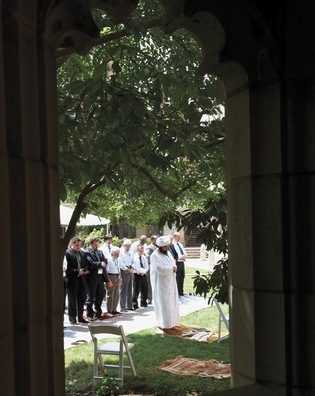 loading
loading
Love thy neighbor Bob HandelmanA group of conference participants at prayer. View full imageMany participants will meet again at the conferences to follow, but they vary widely in how much they intend to take back to their followers. Many leaders have to tread lightly with constituents deeply suspicious of the other side, or risk backlash. For their part, Prince Ghazi and Habib Ali al-Jifri are funding a documentary about the Common Word initiative that they hope to show around the Middle East. The World Evangelical Alliance posted several articles on its website about the conference, and Tunnicliffe said his group plans to participate in the upcoming talks. Anderson, however, says he has "no specific plans to communicate the content of the conference to the NAE, although I'm glad to talk about it." He says the upcoming meetings are "not on my schedule." Schuller, of Hour of Power, had exhorted participants to have "big dreams" for spreading what they had learned. When a Muslim participant asked about his own intentions, he sidestepped the question. Participants came up with a set of concrete steps that Yale, the Royal Aal al-Bayt Institute, and others plan for the coming months. A joint working group will develop ideas brought up at the conference and publish two books, one about the conference and another a study guide. The Muslim and Christian leaders who attended are trying to establish one week a year when Christian and Muslim clergy preach about what is good in the other's faith. Yale and the Royal Aal al-Bayt Institute plan a website "whereby Christians will recommend books on Christianity and Muslims will recommend books on Islam that are appropriate for different ages and address a range of topics," according to a statement issued at the conference. And "many of these Christian and Muslim leaders have invited each other to come speak at their institutions," Cumming adds. "That kind of thing could have a huge impact, and it's not even part of what we planned." Beyond the confines of the Yale conference, the odds against interfaith work are great. The Barnabas Fund, a British-based Christian group that did not attend, later criticized the very use of the words "Judeo-Christian-Islamic monotheistic heritage" at the conference, because it was "a step towards affirming that Muhammad is a prophet." And if participants had picked up the New York Times the day after the conference, they would have seen a story about an increase in religiously tinged attacks against Egypt's Christians. "Things won't change now, not today: I'm investing in this for our children," said Ceric of Bosnia and Herzogovina. "But that isn't an argument for me not to do anything. The chances of violence will only increase if I don't do something to stop it."
The comment period has expired.
|
|